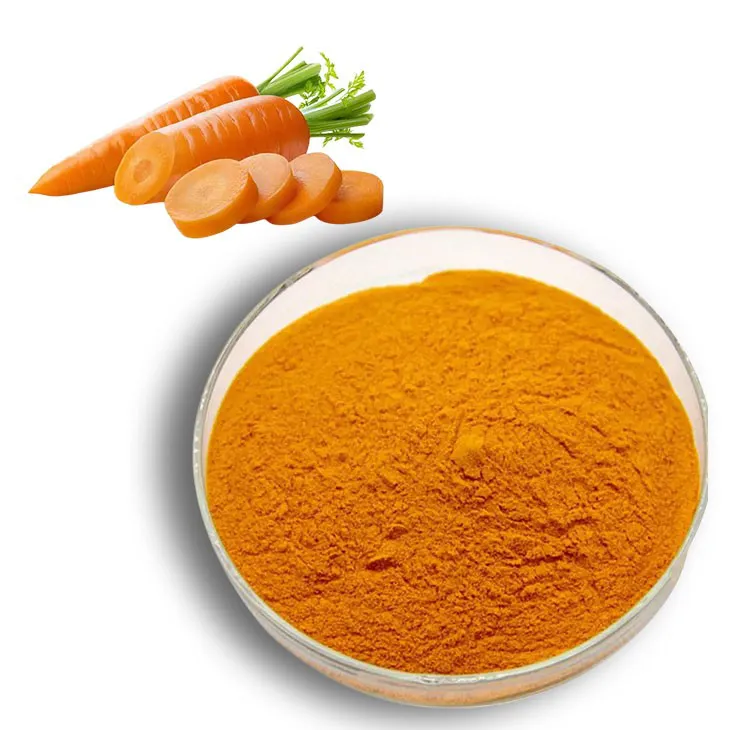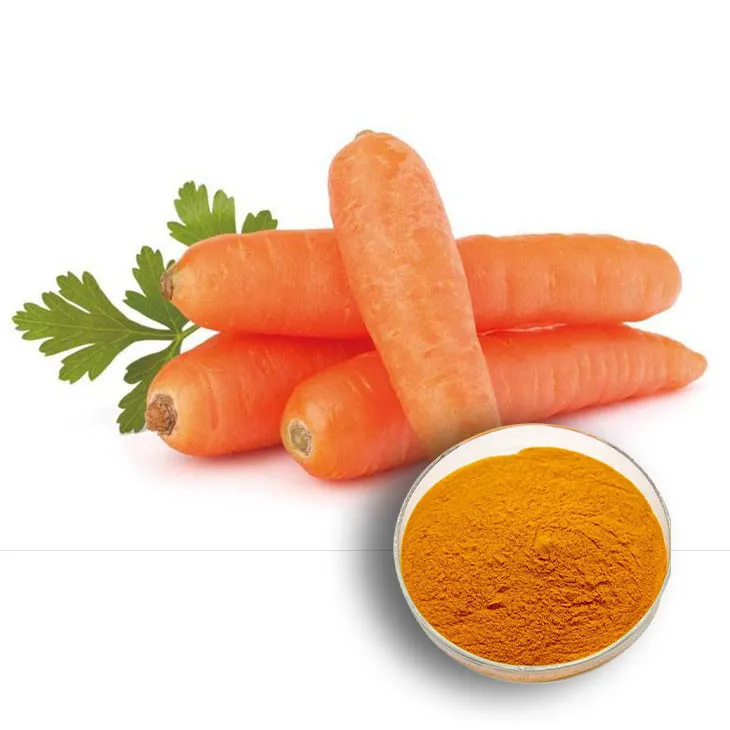- 0086-571-85302990
- sales@greenskybio.com
Navigating the Dose: Dosage Recommendations and Safety Guidelines for Beta Carotene Intake
2024-07-04

1. Introduction
Beta - carotene is a pigment found in many fruits and vegetables that has significant implications for human health. It is a precursor to vitamin A, which is essential for maintaining good vision, a healthy immune system, and proper cell growth and development. However, while beta - carotene offers numerous health benefits, it is crucial to understand the appropriate dosage for intake. This article will explore in - depth the dosage recommendations and safety guidelines associated with beta - carotene consumption, whether through dietary sources or supplements.

2. Understanding Beta - Carotene
Beta - carotene is a type of carotenoid, which is a fat - soluble pigment. It is abundant in brightly colored fruits and vegetables such as carrots, sweet potatoes, spinach, and mangoes. In the body, beta - carotene is converted into vitamin A as needed. This conversion process is a key aspect of its role in health, as it helps to regulate the amount of vitamin A available in the body, preventing potential toxicity from excessive vitamin A intake.

3. Dietary Sources of Beta - Carotene
3.1 Fruits
- Mangoes: These delicious tropical fruits are rich in beta - carotene. A single medium - sized mango can provide a significant amount of this nutrient. - Apricots: Dried or fresh apricots are another good source. They are not only sweet but also pack a nutritional punch with their beta - carotene content.
3.2 Vegetables
- Carrots: Perhaps the most well - known source of beta - carotene. Carrots can be eaten raw, cooked, or juiced, and they are a staple in many diets around the world. - Spinach: This leafy green vegetable is a powerhouse of nutrition, including beta - carotene. It can be used in salads, cooked dishes, or smoothies. - Sweet Potatoes: These are a great alternative to regular potatoes and are loaded with beta - carotene. They can be baked, mashed, or fried in a healthy way.

4. Recommended Dietary Allowance (RDA) of Beta - Carotene
The RDA for beta - carotene is not as straightforward as for some other nutrients because it is related to the body's need for vitamin A. For adult men, it is generally recommended to consume around 900 micrograms (mcg) of vitamin A per day, and for adult women, around 700 mcg per day. Since beta - carotene is converted into vitamin A in the body, the amount of beta - carotene needed to meet these requirements depends on the conversion efficiency, which can vary from person to person.
However, on average, it is estimated that consuming 3 - 6 milligrams (mg) of beta - carotene per day from dietary sources can contribute to meeting the vitamin A requirements. It should be noted that this is a general guideline, and individual needs may vary based on factors such as age, sex, health status, and pregnancy or lactation in women.
5. Benefits of Adequate Beta - Carotene Intake
- Vision Health: Beta - carotene plays a crucial role in maintaining good vision. It is a component of the visual pigments in the eyes, and adequate intake can help prevent night blindness and age - related macular degeneration. - Immune System Support: A sufficient amount of beta - carotene can enhance the immune system. It helps in the production and function of white blood cells, which are essential for fighting off infections. - Skin Health: It can contribute to healthy skin by protecting against oxidative damage. Beta - carotene gives the skin a healthy glow and may also help in reducing the signs of aging.
6. Safety Considerations
6.1 Toxicity from Excessive Intake
While beta - carotene is generally safe when consumed in normal dietary amounts, excessive intake can lead to a condition known as hypercarotenemia. This occurs when there is a buildup of beta - carotene in the body, which can cause the skin to turn yellow - orange, especially on the palms and soles. However, this is a relatively benign condition compared to vitamin A toxicity, which can be more severe and is usually associated with excessive pre - formed vitamin A intake (such as from supplements).
It is important to note that the conversion of beta - carotene to vitamin A is regulated in the body, so it is less likely to cause vitamin A toxicity compared to direct vitamin A supplementation. Nevertheless, extremely high intakes of beta - carotene supplements should be avoided.
6.2 Interaction with Medications
- Cholesterol - lowering Medications: Some medications used to lower cholesterol, such as statins, may interact with beta - carotene. These interactions can potentially affect the absorption or metabolism of beta - carotene. - Anticoagulants: Beta - carotene may also interact with anticoagulant medications. It is important for patients taking anticoagulants to consult their healthcare provider before taking beta - carotene supplements to ensure there are no adverse effects on blood clotting.
7. Beta - Carotene Supplements
- When to Consider Supplements: Supplements may be considered in cases where it is difficult to meet the beta - carotene requirements through diet alone. For example, individuals with a very restricted diet, vegetarians or vegans who may not consume enough beta - carotene - rich foods, or those with certain medical conditions that affect nutrient absorption. - Dosage in Supplements: The typical dosage of beta - carotene in supplements can range from 2,500 - 25,000 IU (International Units). However, it is important to follow the recommended dosage on the supplement label and consult a healthcare provider before starting any new supplement regimen.
8. Special Populations
8.1 Pregnant and Lactating Women
During pregnancy and lactation, the need for beta - carotene and vitamin A is increased. However, it is especially important for pregnant women to be cautious about their intake to avoid excessive vitamin A, which can be harmful to the developing fetus. It is generally recommended that pregnant women obtain their beta - carotene from dietary sources as much as possible and consult their healthcare provider before taking any supplements.
8.2 Elderly
The elderly may have reduced absorption and conversion of beta - carotene in the body. They may also be more likely to have multiple health conditions and take multiple medications, which can affect beta - carotene metabolism. Therefore, it is important for the elderly to have a balanced diet rich in beta - carotene - rich foods and to consult their healthcare provider if considering beta - carotene supplements.
9. Conclusion
Beta - carotene is an important nutrient for overall health, with benefits ranging from vision and immune system support to skin health. Understanding the appropriate dosage, whether from dietary sources or supplements, is crucial for maximizing these benefits while ensuring safety. By following the recommended dietary allowances, being aware of safety considerations, and taking into account special populations, individuals can make informed decisions about their beta - carotene intake and promote their well - being.
FAQ:
What is the general recommended daily dosage of beta - carotene?
The general recommended daily dosage of beta - carotene can vary depending on factors such as age, sex, and overall health. For adults, a common recommendation is around 3 - 6 milligrams per day. However, this can be obtained through a balanced diet that includes fruits and vegetables rich in beta - carotene, such as carrots, sweet potatoes, and spinach.
Can taking too much beta - carotene be harmful?
Yes, taking excessive amounts of beta - carotene can be harmful. High - dose supplementation over a long period may lead to a condition called carotenemia, which causes the skin to turn yellow - orange. There are also some concerns about potential links between very high beta - carotene intake (especially from supplements) and an increased risk of certain health problems, such as lung cancer in smokers.
How can one ensure a safe intake of beta - carotene from diet?
To ensure a safe intake of beta - carotene from diet, focus on consuming a variety of colorful fruits and vegetables. This provides a natural and balanced source of beta - carotene. For example, aim to include different types of leafy greens, orange - colored fruits like oranges and mangoes, and yellow - orange vegetables in your daily meals. This way, you can get an appropriate amount of beta - carotene without the risk of over - consumption.
Are there any specific groups who need to be more cautious about beta - carotene intake?
Yes, smokers are a group that needs to be more cautious about beta - carotene intake. Some studies have suggested that high - dose beta - carotene supplementation in smokers may increase the risk of lung cancer. Pregnant women should also be cautious and consult their healthcare providers about appropriate beta - carotene intake, as excessive amounts could potentially have an impact on fetal development.
How do beta - carotene supplements compare to dietary sources in terms of dosage and safety?
Dietary sources of beta - carotene are generally considered safer as they come in a natural package with other nutrients and fiber. When it comes to dosage, it's easier to control and balance beta - carotene intake through a diet. With supplements, there is a higher risk of over - dosing if not used properly. Supplements may be useful in cases where an individual has difficulty getting enough beta - carotene from their diet, but they should be taken under the guidance of a healthcare professional.
Related literature
- Beta - Carotene and Health: A Review of the Current Evidence"
- "Dosage Considerations for Beta - Carotene Supplementation: A Comprehensive Guide"
- "Safety Aspects of Beta - Carotene Intake: A Meta - Analysis"
- ▶ Hesperidin
- ▶ Citrus Bioflavonoids
- ▶ Plant Extract
- ▶ lycopene
- ▶ Diosmin
- ▶ Grape seed extract
- ▶ Sea buckthorn Juice Powder
- ▶ Fruit Juice Powder
- ▶ Hops Extract
- ▶ Artichoke Extract
- ▶ Mushroom extract
- ▶ Astaxanthin
- ▶ Green Tea Extract
- ▶ Curcumin
- ▶ Horse Chestnut Extract
- ▶ Other Product
- ▶ Boswellia Serrata Extract
- ▶ Resveratrol
- ▶ Marigold Extract
- ▶ Grape Leaf Extract
- ▶ New Product
- ▶ Aminolevulinic acid
- ▶ Cranberry Extract
- ▶ Red Yeast Rice
- ▶ Red Wine Extract
-
Alisma Extract
2024-07-04
-
Alfalfa Meal
2024-07-04
-
Plantain extract
2024-07-04
-
Milk Thistle Extract
2024-07-04
-
Scutellaria Extract
2024-07-04
-
Sophora Flavescens Root Extract
2024-07-04
-
Resveratrol extract
2024-07-04
-
Cocoa Extract
2024-07-04
-
Chia Seed Powder
2024-07-04
-
Tormentil Extract
2024-07-04





















